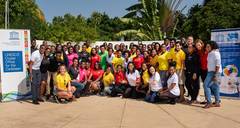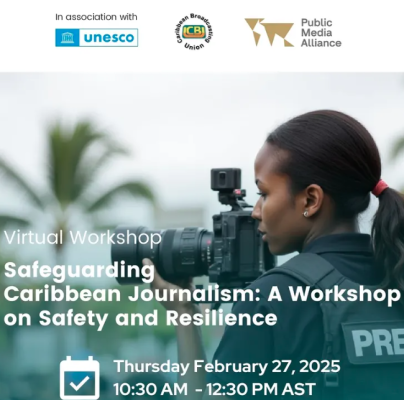Social and Human Sciences Focus on Climate Change, Youth and Sports

This programme aims to support increased participation in sport and physical activity in the Caribbean, in a manner that contributes to the Sustainable Development Goals/Agenda 2030.
In July 2017, during UNESCO’s sixth Ministerial Conference for Sport (MINEPS VI), the international community reached a consensus on the priorities shaping sport for the coming years. With a vision of elevating sport as a real contributor to the UN Agenda 2030 / Sustainable Development Goals (SDGs) and a “best buy” option for socioeconomic development, the Kazan Action Plan was adopted to facilitate a shift from sport policy declarations to measurable action.

Sport plays an important role in the social, cultural and economic life of Caribbean Countries. While its contribution to national development and well-being has long been recognized by many Caribbean Governments, the adoption of the Kazan Action Plan, has provided renewed momentum for an enhanced focus in the region. By developing multi-stakeholder partnerships, strengthening regional policy frameworks and implementation mechanisms focused on carefully selected priorities where sport can contribute to sustainable development, the Caribbean will be well positioned to lead in this area.
Grass-roots initiatives that run on the enthusiasm and energy of local youth activists, often from marginalized and vulnerable communities, are important for realizing the full potential of sport-based approaches to development. Youth, in particular, have a special ability to foster creative and innovative solutions to development challenges. In this regard, the project will greatly benefit from the knowledge of young leaders to support local engagement and create a far-reaching, lasting impact in the community.
As the international community ponders the value of sport, the time is now for Sport Ministers and the broader sport community to move beyond policy declarations and intent and into action. A key priority is to widen the evidence-base to support financial investments into sport, strengthen national policies and implementation mechanisms and to improve capacity to measure the contribution of sport to the sustainable development of the region. These objectives require strong partnerships between decision-makers, sport ministries and all other stakeholders.
In 2019, a special task force will be established to support regional action towards implementing the Action Plan. The Task Force will be responsible or steering the entire initiative, from initial consultation to delivery. All Member Estates and Associate Members will receive the call to join the task force.
International Science School “Building Resilient Societies by bridging Research and Environmental Adaptation to Climate Change in the Caribbean”
At the event, which took place in Havana, Cuba, May 28 – June 1 2018, UNESCO contributed with presentations made by its international science programmes. Contributions by the Intergovernmental Oceanic Commission, Management of Social Transformations Programme, International Hydrological Programme and Man and the Biosphere Programme, as well as the Small Islands and Indigenous Knowledge Section, demonstrated UNESCO’s deep commitment to assisting Small Island Developing States in the Caribbean in relation to the pressing climate change adaptation in the region.
Sixteen Caribbean countries were represented in the event and three ministers from Cuba, Jamaica and Grenada actively participated in the discussions.
Top scholars, high-level officials representing the institutions of civil protection, youth networks and women’s organizations, along with associations from civil society, and representatives from the three main organizations for regional cooperation –CARICOM, OECS, and ACS- provided high quality content for more than 12 panels, roundtables and workshops.
UNESCO Caribbean Youth Network on Climate Change
The Youth Network on Climate Change creates a space that will empower young people to generate the knowledge they need to be an active part of the changes that occur in their communities, particularly the threats and opportunities arising from global warming in the Caribbean region.
The network is being established as a direct result of UNESCO´s International Science School (mentioned above) that reiterated the need to adopt a holistic view of climate change that goes beyond the false dichotomy between the ‘natural’ and the ‘social’.
The Caribbean Youth Network on Climate Change will be operating under the auspices of the UNESCO Cluster Office for the Caribbean and will be focusing on the following activity streams:
1. Awareness Raising. The network will mobilize young people to undertake activities that co-create the meaning of climate change in the context of specific communities in the Caribbean. These activities will address, for instance, the relationship between consumption patterns and the ecological footprint of production and consumption from the beginning to end of the cycle. Such activities will demonstrate the different ways that individual and collective action interact in order to mitigate adapt and transform as the climate changes.
2. Capacity Building. These activities will enhance the capacity of young people to contribute to positive changes. Practicing and implementing such changes requires, in part, the ability to explain and convince others to make common cause. One of the tools for making this happen is non-formal peer-to-peer capacity building using a speed-mentoring format.
3. Using the Future. Since all decisions are about the future and climate change is also about the future, it is essential that as young people co-create awareness and capacity in their different and diverse communities. Enhancing young people’s ability to ‘use-the-future’ more effectively and efficiently, as UNESCO has been doing for a number of years through its Futures Literacy activities, contributes directly to the awareness raising and capacity building goals of this Youth Network.
